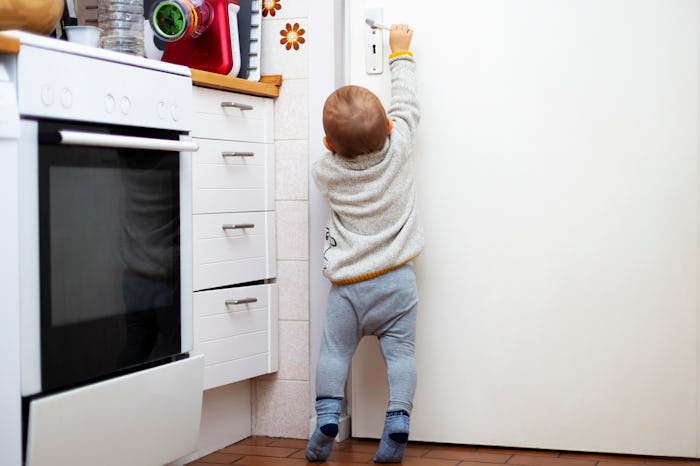Life

These 6 Reasons Explain Why Toddlers Are So Freaking Obsessed With Doors
In my house, there are 30 doors (including closets). I only know this random number because at almost any given point during the day, I’m warning my two little ones to stop swinging/slamming/shutting/opening/closing them. My toddlers’ obsession with doors only rivals their obsession with dinosaur chicken nuggets and chocolate.
I’ll be in the middle of telling the 4-year-old something, and I’ll find her dangling off of a doorknob by, like, her leg. Then, the 2-year-old, in a total monkey-see-monkey-do move, will push the door with all his might to swing it — and her — on it. And while I’m shrieking because, hello, I don’t want someone to fall and crack their head open, they’re hysterically laughing. Gotta love parenting.
In a way, I totally get it. Doors are fun. They do a whole lot more than just let people pass through them. “Toddlers find new spaces and tasks exciting, and doors are one of them,” Anastasia Gavalas, MS, SDA, a parenting expert and author of Leadership Through the Eyes of Children, tells Romper. Still, I’ve seriously considered stripping my house of all the unimportant doors (as parents, do we even really need a bathroom door, anyway?) as a way to keep my littles safe.
But as it turns out, toddlers can learn a lot from doors. Here are some reasons why you might want to keep them on their hinges — without you becoming unhinged yourself.
1They Learn Cause & Effect
There truly is no greater example of cause and effect than opening and closing a door. “Toddlers are fascinated with how things work and where they go,” Kevon Owen, M.S., LPC, a clinical psychotherapist, tells Romper. “The movement and motion of door hinges and knobs are mechanical brilliance.” By discovering how things work, your child learns how to make that happen, which can be pretty empowering stuff for a small kid.
2It Gets A Reaction
When your kids are little, the last thing you want is for them to get their fingers caught in between the door and the frame. Ouch! So naturally, you’re going to run, screaming and yelling, towards your kid telling him to cut it out. And that’s exactly what they want. “The best part for a toddler is probably the reactions they get from adults,” says Gavalas. “Chances are, if they close and open enough doors their parent/caregiver is sure to respond in an animated manner.” Yep, by yelling and screaming.
3It Reinforces Memorization & Fine Motor Skills
Forget about flash cards. Opening and closing a door is a great method for kids to boost their memory skills. “They develop their memory as they repeat tasks and opening/closing doors is on the top of the list,” says Gavalas. And not only are they making their memories work, but their muscles are working, too. “Opening and closing doors demonstrates fine motor skill development, small muscle strength and dexterity,” she says.
4It’s Fun
Doors are your child’s very own indoor jungle gym. You can climb up on them, hang on the doorknob, and even swing them back and forth. Let’s face it: doors are fun when you barely reach the doorknob. And unlike other toys that might topple over, doors can support your child’s weight without falling over. “As far as swinging, my teenagers would still be swinging from them if they could!” says Gavalas. Doors are kind of like your very own swing/slide that your child has easy access to in your home. Although it’s unlikely that you’ll be able to stop your child from playing with doors entirely, you should still supervise her to make sure that she doesn’t get hurt. Kids who get their fingers stuck in doors run the risk of swelling, deep cuts, or even fracturing their finger, Healthy Children reported.
5It’s Risky
At an early age, your child might learn that it’s fun to take risks, and to feel that adrenaline rush from doing something that he knows he probably shouldn’t do. And while letting your child take a risk might seem, well, risky, there is science that backs up your budding little daredevil’s actions. Risky play can help build up your child’s confidence and control their fear without letting it control them, reported Psychology Today.
6It Makes Them Feel Secure
Think about it. How many times have you tried to pee only to have a kid crash in on your private time in the bathroom? The door acts as a barrier between you and your ability to, you know, poop in peace. But once your child learns how to open a door, then it no longer stops them from getting to you. “Toddlers are grappling with the attachment and separation process,” Dr. Fran Walfish, a child psychologist and author of The Self-Aware Parent, tells Romper. “By opening and closing doors, your child is reaffirming that when she goes away from you, you will be securely based in the same place for her to return to.” Even if that place is the toilet.
In a way, toddlers and doors go together like peanut butter and jelly. While you obviously shouldn't encourage your kiddo to play with doors, be sure to monitor her to ensure that she doesn’t get hurt by one, either. And maybe, just maybe, you should embrace it for the toddler learning experience that it is.
This article was originally published on